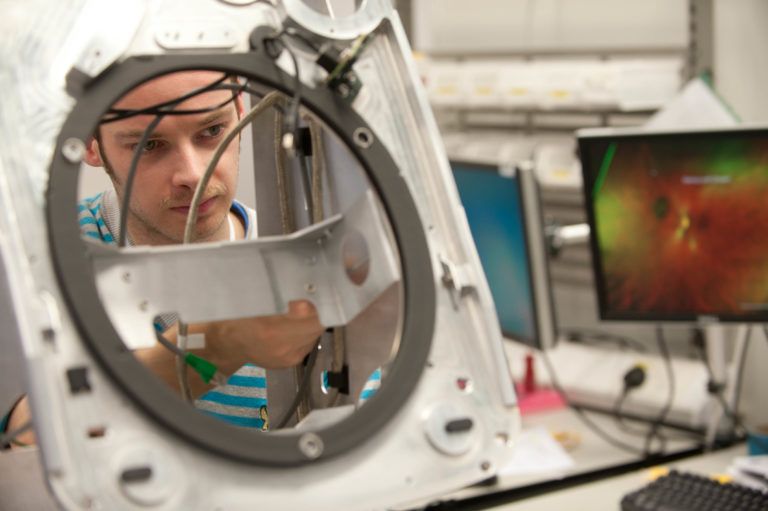
CENSIS funds groundbreaking eye camera research to ‘redefine the benchmark’ of scanning laser ophthalmoscopy
- This project was covered in The Herald and other publications in May in 2014
CENSIS has announced a research project in collaboration with Dunfermline-based ophthalmic company, Optos, to develop new imaging technologies for the eye care market.
The partnership, between the University of Glasgow and FTSE-listed Optos, will explore the limits of ultra-widefield scanning laser ophthalmologic cameras, looking at new ways to improve the clarity of eye images and improve patient care.
CENSIS awarded £50K for a joint project between the University’s specialist Imaging Concepts Group and Optos’ Research department to test the possibilities of increasing the scope and image quality of scanning laser ophthalmoscope lenses. A further breakthrough in this technology could change the way optical imaging is undertaken worldwide, and might also be used to make complex eye exams more accessible to remote locations and the developing world.
Ian Reid, CENSIS CEO said: “A successful outcome from this project will mean significant business growth and market security for Optos, while giving the team at University of Glasgow invaluable contact with a key local company of growing scale, and extending their expertise and exploitation track records. “This research will contribute towards advances in the incredibly important field of scanning laser ophthalmoscopy while also helping Scotland grow and develop talent in emerging technologies. This project is a win-win for all parties.”
Dr. Jano van Hemert, Imaging Research Manager & Academic Liaison, from Optos said: “We’re working in a very competitive environment and we expect to remain at the forefront of the sector with continuous research and improvement of our technology. The outcome of the CENSIS funding for this research project is expected to be a number of credible candidates to be taken forward internally with a view to implementing one of those in our existing product base.
Alex Warnock, Chief Operating Officer for Optos added, “Success in this project will lead to significant further collaboration between Optos and the University of Glasgow in the development of this and other new products. It will also give us the confidence to engage academic partners more closely in our ongoing R&D strategy. “Our aim is to remain the market leader in scanning laser ophthalmoscopes for eye health care, and to continually push the boundaries of what is possible with our technology for the benefit of our customers and their patients. This research partnership – where we will also be benefitting from University of Glasgow’s cutting-edge computational imaging capabilities – will enable us to do that.”
Professor Andy Harvey, leader of University of Glasgow’s Imaging Concepts Group, said: “The partnership with CENSIS and Optos will promote interaction between universities and industry, while also helping to bring a new and commercially viable technology to market.
“Projects like this are extremely important for the future of Scotland’s technology industry, since they provide our doctoral students with valuable experience of how the research they conduct can be used to drive commercial and economic benefit on a broader scale.”
Ophthalmoscopes are cameras which are used to photograph the interior surface of the eye in order to diagnose conditions ranging from eye diseases to brain tumours. Currently, Optos plc’s scanning laser ophthalmoscopes produce the world-leading ultra-widefield images of the retina (200°), the largest image of the retina by any technology. The team at University of Glasgow and Optos expect to develop the technology for patient use in the near future.